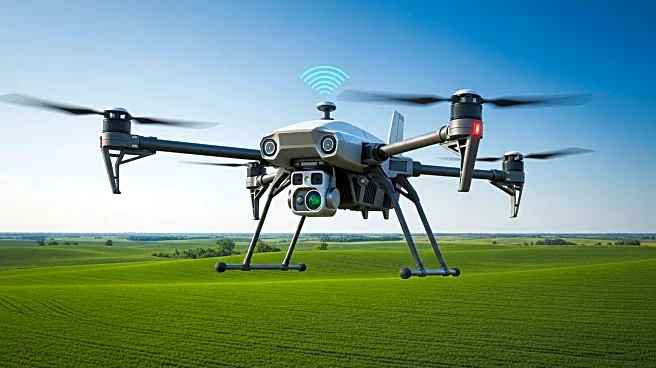What is the story about?
What's Happening?
Iowa farmers are increasingly turning to artificial intelligence (AI) to manage the overwhelming amount of data generated by modern agricultural practices. This 'data deluge' includes variables such as soil type, irrigation practices, and weather patterns. At the Iowa Ideas conference, experts like Baskar Ganapathysubramanian from Iowa State University highlighted how AI can transform agriculture by providing actionable insights rather than just raw data. AI applications in agriculture include predictive modeling for plant breeding and tools like InsectNet, an app that identifies insect species using AI. However, challenges remain, such as data privacy concerns and the need for trust-building between farmers and organizations.
Why It's Important?
The integration of AI in agriculture is significant as it promises to enhance productivity and efficiency in farming, a critical sector in the U.S. economy. By providing insights into yield outcomes and plant genomics, AI can help farmers make informed decisions, potentially leading to increased profitability and sustainability. However, the success of AI adoption depends on overcoming data privacy issues and building trust with farmers. The reluctance to share data due to privacy concerns could hinder the development of AI tools, impacting the pace of technological advancement in agriculture.
What's Next?
Future steps involve addressing data privacy concerns through methods like federated learning, which enhances privacy by not requiring data to be uploaded to centralized servers. Building strong relationships between farmers and agricultural organizations will be crucial in encouraging the adoption of AI tools. As AI technologies evolve, ongoing collaboration between agronomists, data scientists, and farmers will be essential to refine these tools and ensure they meet the practical needs of the agricultural community.
Beyond the Headlines
The ethical implications of AI in agriculture include ensuring that AI systems do not replace human decision-making but rather augment it. The long-term impact of AI could lead to a shift in farming practices, with a greater emphasis on data-driven decision-making. This could also influence educational programs in agriculture, emphasizing the importance of data literacy among future farmers.
















